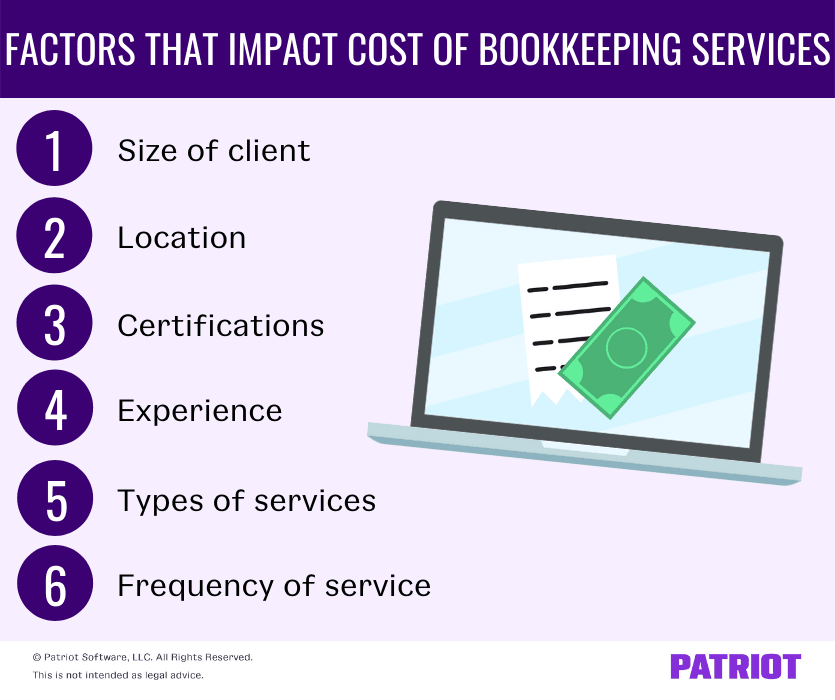As an accounting professional, it’s your mission to help your clients keep their books as clean and accurate as possible. Well, at a fair and reasonable price, of course. But, how much should a bookkeeper charge for services? We’ll break down the factors that go into cost and averages so you can answer the question, How much should I charge for bookkeeping services?
How much should I charge for bookkeeping services? 6 Factors to consider
You know what they say—“You get what you pay for.” And, that saying holds true for bookkeeping services. You should be charging your clients accordingly for your services. But, you certainly don’t want to overprice your offerings. Otherwise, you could wind up losing clients to other firms (and no bookkeeper wants that).
So, what impacts how much you should charge your clients for bookkeeping services? Here are a few considerations to make when setting your prices:
- Size of client
- Location
- Certifications
- Experience
- Types of services
- Frequency of service
Size of client
At some point or another, you may have clients of all sizes—aka small, medium, and large clients. And when one client’s size is larger than another client, you’re going to want to price services accordingly.
Smaller clients generate less revenue than medium or large clients. Therefore, you generally want to charge a small client less because they have fewer needs. For example, you may have different pricing for a larger client (e.g., physical therapist) who has $1.5 million in revenue annually than for a small client (e.g., small business) that has an annual revenue of $200,000.
When setting your bookkeeping services prices, consider creating different tiers for the size of the client. That way, you charge accordingly.
Location
Location can play a major role in how much you charge for services. Price for bookkeeping services can vary from state to state. So, it’s important to know how much to charge clients based on location.
Do your research ahead of time to find average rates for services in your state. If needed, make adjustments to your pricing to reflect costs in your locality or state.
Certifications
There are a number of certifications you can get as a bookkeeper. And in turn, these certifications can increase your expertise (and your pricing).
Many clients may be willing to pay a little more in exchange for trustworthy knowledge and training. If you have special certifications, you may be able to make some price adjustments—and clients may be more than willing to pay for said adjustments if they know it means a higher level of trust and competency.
Some accounting certifications clients may want to see include:
- Certified Public Accountant (CPA)
- Certified Management Accountant (CMA)
- Certified Fraud Examiner (CFE)
- Certified Internal Auditor (CIA)
Experience
Certifications and experience work similarly. Chances are, clients are going to be more willing to pay an accounting firm more money over another if they have more experience.
So, don’t be afraid to boast about your experience while marketing your accounting firm. And, use it as a competitive advantage when it comes to pricing your offerings.
Types of services
What kinds of services does your firm offer? Account reconciliation? Invoicing? Catch-up reporting? Taxes? Payroll? The more you offer, the more you need to reconsider the price you charge for bookkeeping services to ensure you’re charging clients the right amount for your services.
If a client takes advantage of multiple services, charge accordingly. You may also want to increase pricing depending on what services are in demand and when they’re being taken advantage of (e.g., last-minute requests).
Look at the types of services you offer and compare what you currently charge to others. Is it too high? Too low? Use your findings to price your services the right way.
Frequency of service
Consider how frequently you provide services to a client when making up your mind about what to charge. Some clients will be a one-time deal, while others may need you on a regular basis (e.g., quarterly).
Clients may fall into the following:
- One-time
- Monthly
- Quarterly
- Annually
Typically, you’ll want to charge your more frequent clients at a lower rate because you’re seeing them more often and reviewing their books on a regular basis. For one-time clients, you may decide to charge more since you know they may not return and have last-minute requests and needs.

Average prices for bookkeeping services: Fast facts
How much to charge for bookkeeping is a big question. After all, there are varying factors that can impact price. And, you may have a million questions running through your mind like, “How much should a bookkeeper charge per hour?” and “What are other bookkeepers charging for the same services?”
To help answer some of your burning questions, take a look at a few average rates:
- The average hourly wage for a bookkeeper in the U.S. is $22 per hour.
- CPAs typically charge $200 – $250 per hour.
- Top bookkeepers in major cities may charge $500 per hour (or more).
Again, the best course of action for you to take when setting prices is doing your research. Take a look at industry averages, rates by state, and more to get an idea of how much to charge your clients.
Bookkeeping services pricing structure
Along with considering the above factors when setting your pricing for bookkeeping services, you’ll also want to set up a pricing structure that works for you and your firm.
How you charge customers depends on your preference and the tasks you’ll be completing. Here are some types of pricing you may consider implementing:
- Hourly rate pricing: Charging clients on an hourly basis for services
- Fixed rate pricing: Have clients pay a fixed amount up front
- Percentage of client’s income: Charge based on a percentage of your client’s revenue (works well if you have a lot of different sized clients)
- Per bank account: Charge clients based on how many bank accounts you need to manage, reconcile, etc.
- Per transaction: Charge clients per transaction
You may also consider throwing in other costs, like a fee for an initial consult, to your pricing structure.
Whatever structure and pricing you go with, make sure to lay it all out on the table for current and prospective clients. That way, there are no surprise fees, and clients know what to expect from you.
Bookkeeping services cost: Bottom line
As you can tell, how much you should charge as a bookkeeper can vary based on a lot of factors. So, you need to take your time when setting prices for your services.
To ensure your prices are fair to both you and your clients, you can:
- Research overall average rates in the industry
- Check out state by state averages
- Look at different pricing strategies
- Consider all of the factors that can impact price (e.g., expertise, certifications, etc.)
When it comes to setting prices for your bookkeeping expertise, take note from Goldilocks and choose a price that’s “just right.” You don’t want your prices to be too low and you don’t want your prices to be too high. Otherwise, you may wind up missing out on profits or scaring off clients with high rates.
Do your due diligence to make sure you’re billing your clients fairly. But, don’t minimize your worth and expertise in the pricing process.
This is not intended as legal advice; for more information, please click here.

